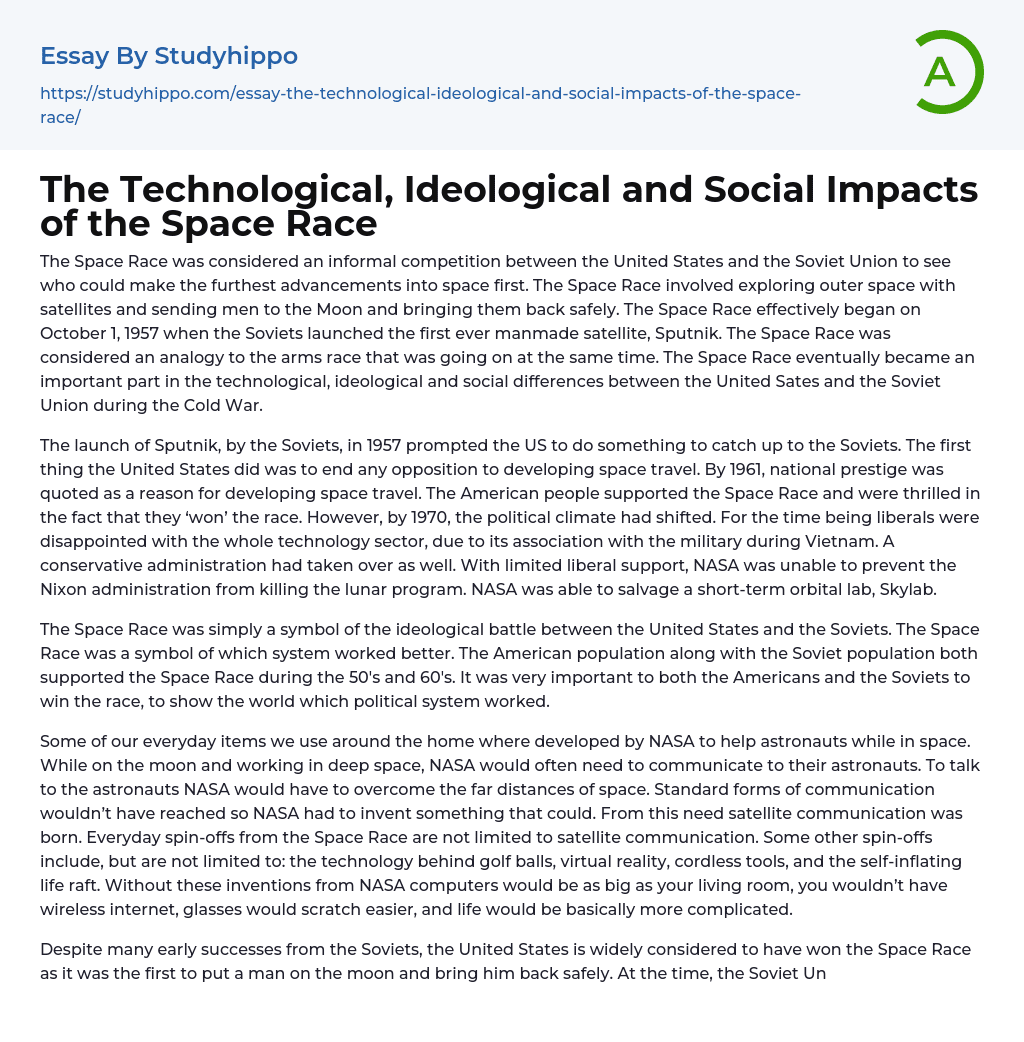

The Technological, Ideological and Social Impacts of the Space Race Essay Example
The Space Race was considered an informal competition between the United States and the Soviet Union to see who could make the furthest advancements into space first. The Space Race involved exploring outer space with satellites and sending men to the Moon and bringing them back safely. The Space Race effectively began on October 1, 1957 when the Soviets launched the first ever manmade satellite, Sputnik. The Space Race was considered an analogy to the arms race that was going on at the same time. The Space Race eventually became an important part in the technological, ideological and social differences between the United Sates and the Soviet Union during the Cold War.
The launch of Sputnik, by the Soviets, in 1957 prompted the US to do something to catch up to the Soviets. The first th
...ing the United States did was to end any opposition to developing space travel. By 1961, national prestige was quoted as a reason for developing space travel. The American people supported the Space Race and were thrilled in the fact that they ‘won’ the race. However, by 1970, the political climate had shifted. For the time being liberals were disappointed with the whole technology sector, due to its association with the military during Vietnam. A conservative administration had taken over as well. With limited liberal support, NASA was unable to prevent the Nixon administration from killing the lunar program. NASA was able to salvage a short-term orbital lab, Skylab.
The Space Race was simply a symbol of the ideological battle between the United States and the Soviets. The Space Race was a symbol of which system
worked better. The American population along with the Soviet population both supported the Space Race during the 50's and 60's. It was very important to both the Americans and the Soviets to win the race, to show the world which political system worked.
Some of our everyday items we use around the home where developed by NASA to help astronauts while in space. While on the moon and working in deep space, NASA would often need to communicate to their astronauts. To talk to the astronauts NASA would have to overcome the far distances of space. Standard forms of communication wouldn’t have reached so NASA had to invent something that could. From this need satellite communication was born. Everyday spin-offs from the Space Race are not limited to satellite communication. Some other spin-offs include, but are not limited to: the technology behind golf balls, virtual reality, cordless tools, and the self-inflating life raft. Without these inventions from NASA computers would be as big as your living room, you wouldn’t have wireless internet, glasses would scratch easier, and life would be basically more complicated.
Despite many early successes from the Soviets, the United States is widely considered to have won the Space Race as it was the first to put a man on the moon and bring him back safely. At the time, the Soviet Union denied having a lunar program at all, but released documents have proved otherwise. However the U.S. government made its wish to land on the moon public and invested heavily in that goal. With the concentration of political will and financial resources, the Americans were the first to develop
a rocket that could reach the moon, successfully launching the Saturn V in 1967. The Soviet option, the N-1, continually failed in its efforts to reach the moon. Once the Americans had the technology to send astronauts and equipment to the moon, it was only a matter of time before they achieved a moon landing.
The Space Race was an instrumental part of the rising tension between the United States and the Soviet Union during the Cold War. Apart from boosting US moral the Space Race had several long-lasting impacts on not only the US but the whole world. These impacts were technological, ideological and economical/social.
- Agriculture essays
- Albert einstein essays
- Animals essays
- Archaeology essays
- Bear essays
- Biology essays
- Birds essays
- Butterfly essays
- Cat essays
- Charles Darwin essays
- Chemistry essays
- Dinosaur essays
- Discovery essays
- Dolphin essays
- Elephant essays
- Eli Whitney essays
- Environmental Science essays
- Evolution essays
- Fish essays
- Genetics essays
- Horse essays
- Human Evolution essays
- Isaac Newton essays
- Journal essays
- Linguistics essays
- Lion essays
- Logic essays
- Mars essays
- Methodology essays
- Mineralogy essays
- Monkey essays
- Moon essays
- Mythology essays
- Noam Chomsky essays
- Physics essays
- Plate Tectonics essays
- Progress essays
- Reaction Rate essays
- Roman Numerals essays
- Scientific essays
- Scientific Method essays
- Scientist essays
- Seismology essays
- Space Exploration essays
- Stars essays
- Sun essays
- Thomas Edison essays
- Tiger essays
- Time Travel essays
- Universe essays



